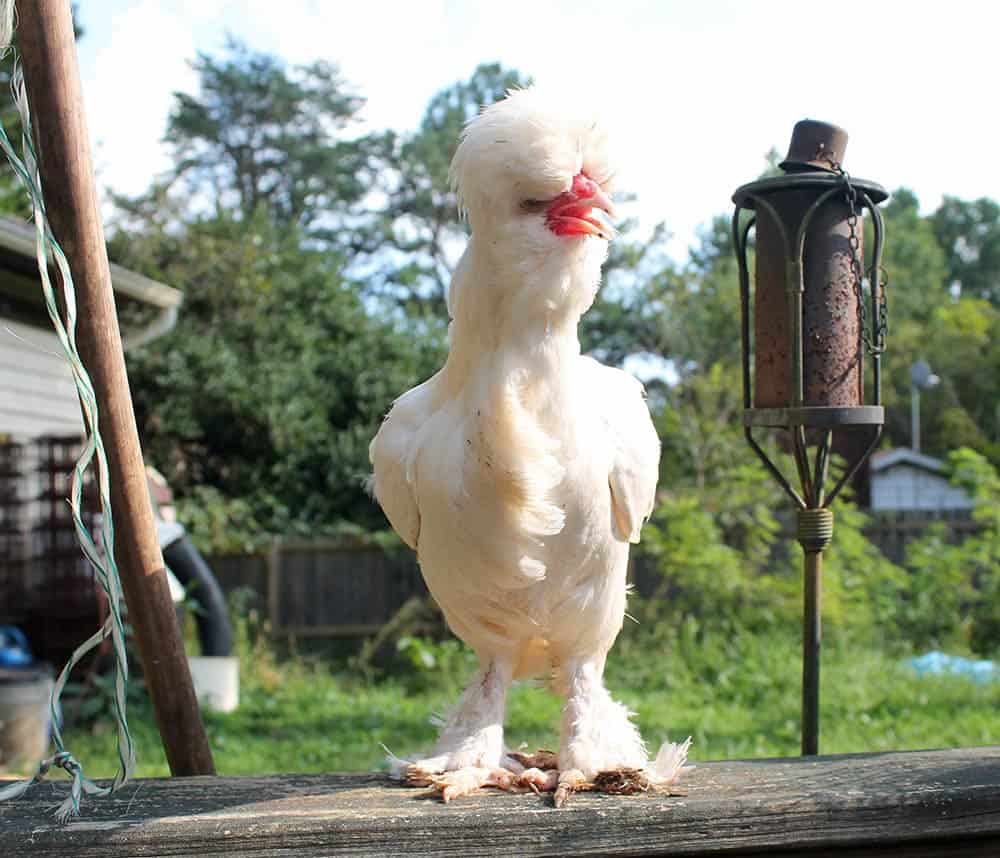The Sultan chicken is one of the most unique-looking chickens out there. Once you’ve seen one, there’s no mistaking that you’re looking at a Sultan! This breed is also one of the oldest and rarest around today.
If you would like to learn more about this amazing-looking bird, here, we cover its history and a few of its more unique personality traits, along with its appearance.

Quick Facts About the Sultan Chicken
| Breed Name: | Sultan |
| Place of Origin: | Turkey |
| Uses: | Ornamental |
| Rooster (Male) Size: | 5 – 6 lbs. |
| Hen (Female) Size: | 4 lbs. |
| Color: | White, blue, and black |
| Lifespan: | 5 – 8 years |
| Climate Tolerance: | Hot or warm and dry |
| Care Level: | High |
| Broodiness: | Poor |
Sultan Chicken Origins
The Sultan chicken originated in Turkey, and the white breed specifically was popular with Turkish royalty. It is known as the Serai Taook and Serai Tavuk in Turkey, where it is still popular, but no one really knows when it originated, just that it’s an old breed.
The birds were imported into England by 1854 and made their way to the United States in 1867. They were added to the American Poultry Associations Standard of Perfection in 1874.

Sultan Chicken Characteristics
Sultan chickens are fast growers and are considered friendly, docile, and calm birds. They are also considered among the tamest of the chicken breeds and enjoy being picked up, petted, and held.
They are known to be inquisitive, curious birds that are quite smart and can learn their names and come when they are called. They are also rather chatty chickens, which doesn’t mean they are loud — they just enjoy having long conversations. If a Sultan sounds noisy and like it’s complaining, it’s probably because something is wrong.
If a Sultan ever seems to be klutzy or nervous and skittish, it could be because it can’t see through the copious number of feathers on its crest. This is when it should be trimmed.
Sultan chickens are not good foragers and don’t thrive in a cold and wet climate. They also don’t know how to fend for themselves and are easily taken by predators. The feathers on their crests make it difficult for them to see any approaching danger.
Many chicken keepers list the Sultan as their favorite. Its friendly and quirky temperament combined with its amazing appearance makes for a wonderful chicken breed. It even gets along quite well with children and enjoys being carried around.
However, due to its sweet and docile nature, it can easily fall victim to abuse and bullying by other chicken breeds. This bird should only be kept with other Sultan chickens or gentle chicken breeds.
Uses
A while ago, these chickens were used for their meat, but this is no longer the case, likely because they are so rare and aren’t the best breed for meat production.
They are also not that broody or great egg producers. A Sultan hen only lays about one egg a week, which works out to 50 eggs a year. The eggs are also small, and the hens don’t typically sit on them.
Sultan chickens are best kept as pets and ornamental birds. They are unique, attractive, and quite eye-catching, but they are not productive nor are they hardy.
Appearance & Varieties
Here is where the Sultan chicken truly shines! It comes in three colors, which are black, blue, and most commonly, white.
These birds are completely covered in feathers. Their quite large and decorative crests are heavily feathered (and give them an Old English Sheepdog appearance). They also have feather beards from which you can see bright-red V-shaped combs peeking out. Their legs and feet are covered in an explosion of feathers!
Sultans carry their wings low, which hides their thighs and upper hocks. Unlike most chicken breeds, they have five toes instead of the usual four.
Sultans are small chickens, though, with the rooster weighing 5 to 6 pounds and hens 4 pounds. There are also bantam Sultans, and the roosters typically weigh about 1.6 pounds and the hens weigh 1.4 pounds.
Population, Distribution & Habitat
Sultan chickens are best kept where the climate is warm and dry. They do well in the heat but can’t withstand cold or wet weather. They always need access to dry bedding because of the feathering on their feet.
This is not a hardy breed and it doesn’t forage well. However, these birds are good flyers, so they need high fences. Sultans need protection from the weather if it’s cold and wet, as well as from predators. But they do quite well in confinement.
Unfortunately, they are rare birds; the Livestock Conservancy has placed the Sultan on their Conservation Priority List as critical. This means there are fewer than 500 Sultans in the United States and fewer than 1,000 worldwide.

Are Sultan Chickens Good for Small-Scale Farming?
Since Sultans need a great deal of specific care and can only be housed with other similar chickens, they are not good for small-scale farming. They are typical ornamental pets and can’t contribute much to meat or egg production.
But if you’re in the market for a small ornamental chicken that is super friendly and will be the talk of the farm, then find yourself a Sultan chicken!
Featured Image Credit: Consolvo Images, Shutterstock
